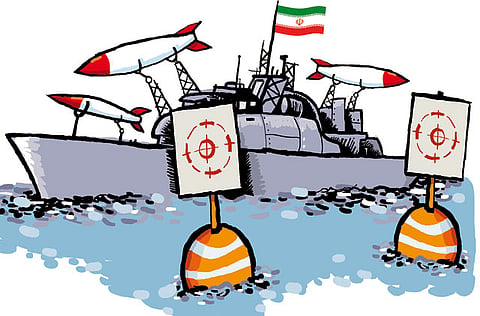Iran sends warning with naval exercises
Despite its bluster, Tehran will not be able to respond if it is attacked by the US

The Iranian naval manoeuvres that were conducted last month in the Gulf differed from the military exercises conducted over the past four years to mark the Revolutionary Guards' anniversary. This, because they came amidst high tensions between Iran and the West due to Tehran's nuclear programme and increasingly antagonistic role in the region.
Tehran has justified the manoeuvres by saying that it takes US threats to its national security seriously, especially those related to the new US Nuclear Posture Review. The document lays out a rationale that would justify the use of nuclear weapons, and Iran and North Korea are singled out as potential targets.
It seems the Iranian naval manoeuvres were intended to send a message to the West. Iran is under increasing pressure due to efforts to introduce a fourth round of sanctions and a growing conviction that it may ultimately be necessary to resort to force.
Iran has responded in two main ways. Firstly, the Revolutionary Guards boarded two non-military ships — one Italian and the other French — in the Strait of Hormuz. The vessels were inspected under the pretext of ensuring that they were not carrying materials that could harm the Gulf environment. This move sent a loud and clear message that Iran is prepared to shut down the Strait, which is the vein that carries fuel to the West, and the lifeline of six Arab countries that overlook the Gulf and market their oil through the Strait.
Secondly, Iranian frogmen planted mines in the Strait and other locations in the Gulf in a first of its kind operation under the pretence of protecting the Gulf, as though it were a lake within Iran's borders. Although the Iranians stressed that their manoeuvres were not intended to threaten their neighbours and were in the interest the region as a whole, it is very difficult to share this view.
Rather than seeking to magnanimously defend the Gulf, Iran is making a statement with these manoeuvres about its readiness to deter any possible aggression against it.
Military threat
The UN Security Council members, Germany and Israel are the main source of the dangers that may confront Iran because of its insistence on pursuing its nuclear programme. Countries such as Russia and China would not go further than supporting sanctions against Iran. However, other countries, such as the US and Israel, could conduct a military operation to terminate or at least hinder Iran's nuclear programme. Countries such as France may be willing to offer support for such an operation because they are strongly opposed to Iran becoming a nuclear power.
Iran is anticipating a military attack against its nuclear facilities for a number of reasons, such as the memo presented by the Pentagon to Obama's office, indirectly criticising the US president for not having a clear strategy for Iran. US Secretary of Defence Robert Gates has also said that Iran may be able to manufacture a nuclear weapon within a year. Russian President Dmitry Medvedev has claimed that the US and Israel have plans in place to carry out an offensive against Iranian nuclear facilities, warning that such a strike would entail the use of nuclear weapons. And the chairman of the US Joint Chiefs of Staff, Navy Admiral Mike Mullen, said that a military strike would greatly hinder Iran's nuclear programme, contrary to what some analysts have said about the ability of Iran's fortifications to withstand a conventional military offensive.
If the military option is taken, what will Iran do?
Iran cannot defend against a military strike, as it does not have the air force to match the aerial capabilities of the US and Israel. It also does not have the anti-aircraft capabilities to bring down attacking warplanes, as it did not succeed in obtaining Russian S-300 missiles. Furthermore, it does not have the ability to shield itself from long-range missile attacks. It is also inconceivable that the small boats that took part in Iran's naval manoeuvres would be able to target US warships, as envisaged in their exercises.
So, how will Iran respond in the event of an attack against it?
The US, the country that might conceivably carry out a military offensive against Iran, is far away geographically, out of its reach. But Iran is able to reach US interests and bases in the region, and this is exactly what it is threatening to do. However, these bases are located in the territories of Iran's neighbours, such as Turkey, Iraq and other Arab Gulf countries. This would make it very difficult for Iranian officials to argue that attacks on them were not attacks on their host countries.
- Mohammad Akef Jamal is an Iraqi writer based in Dubai.
Sign up for the Daily Briefing
Get the latest news and updates straight to your inbox


